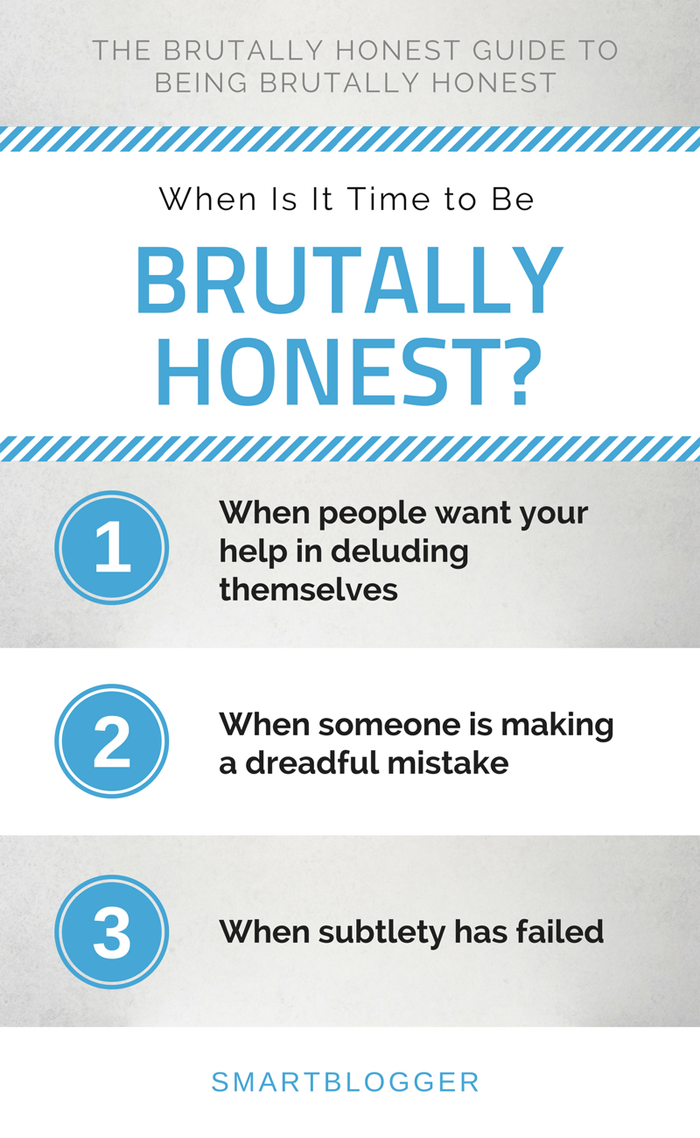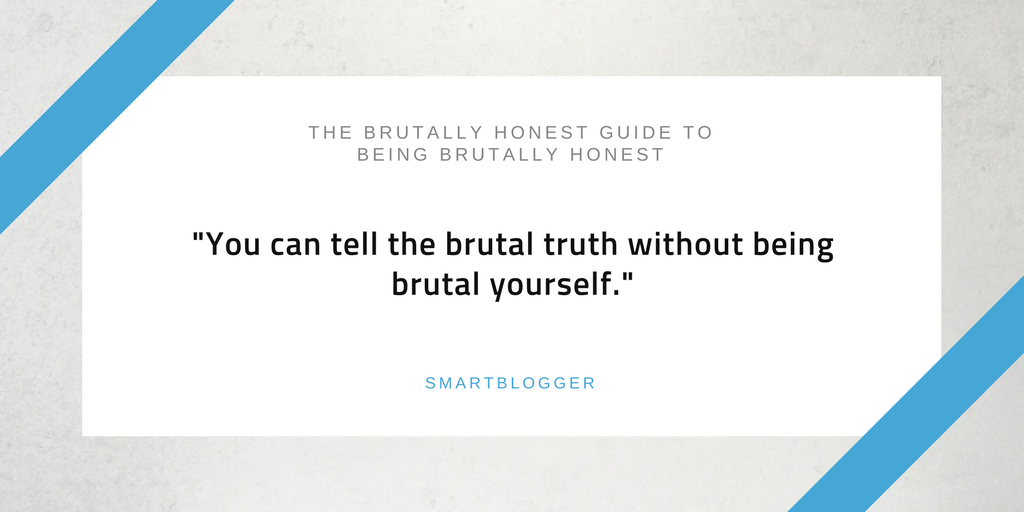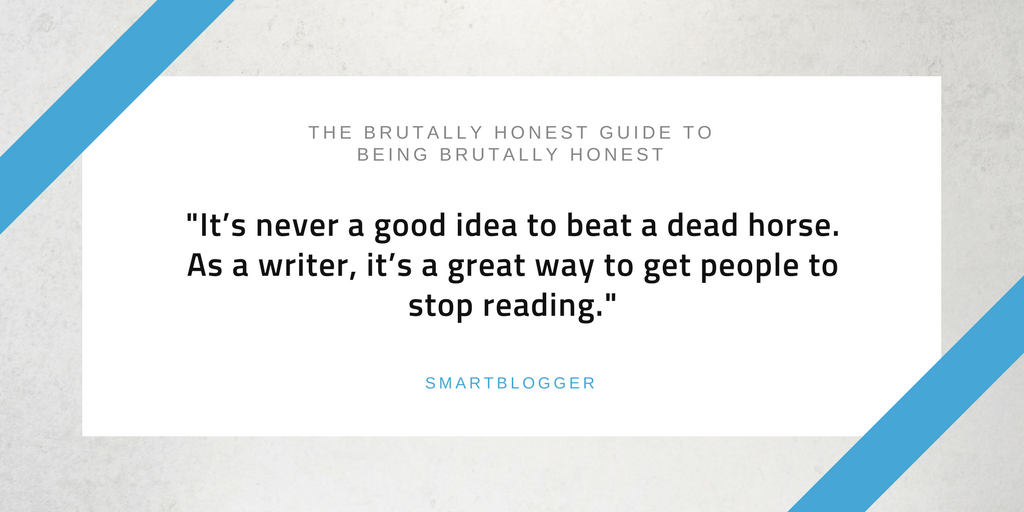It’s scary, isn’t it?
Having to tell a truth to someone who may not want to hear it.
Whether you have to tell a friend they’ve been betrayed, inform a client that their ideas suck, or write a blog post to burst your reader’s bubble, hard truths can feel almost as painful to deliver as they are to receive.
Because just the thought of hurting someone is scary. You don’t want that.
And you don’t know how they’ll react. They might think you’re a jerk and cut all ties with you. You don’t want that either.
So sometimes you obfuscate the truth to spare them the pain of hearing it. Sometimes you even keep it to yourself or tell a white lie.
Well, I have to tell you something, and you may not like to hear it. But if you struggle with the art of being frank, you need to hear this. It will make you a better person, a better communicator and a better blogger.
So here it is …
You’re a coward.
If you can’t be brutally honest with people, especially when you know it’s in their best interest, you’re a coward.
Why You Can’t Be a Coward When It Comes to Hard Truths
You’re not doing anyone a favor by withholding a truth from them, even if it’s difficult for them to hear.
The only person you’re protecting is yourself. Because you’re afraid of the consequences to you.
But it’s not about you.
Being honest is about making sure your audience has the information they need to make good decisions. That includes information they may not like.
You may convince yourself it’s “nicer” to hide or obfuscate things that are difficult for them to hear, but it’s not.
Ignorance doesn’t lead to bliss, it leads to bad decision-making. There’s nothing “nice” about that.
And as a blogger trying to help your readers, honesty is that much more important.
Because readers rely on your expertise and your candor. They rely on you to set them straight when they’re headed the wrong way. They rely on you to guide them in the right direction.
You may fear you’ll lose readers when you tell them a hard truth, but withholding it is far riskier. Because it’s not why you started your blog, and it will hurt your credibility in the long run.
When you’re honest at all times, whether in your writing or in your personal life, people will know what to expect from you. And when they need the truth, you’re the one they will come to.
Yes, you may lose some readers along the way, but you’ll gain the trust and respect of so many more.
The Big Mistake People Make While Being Brutally Honest
Brutal honesty is not about being cruel, rude, shocking, or harsh. That’s not brutal honesty. It’s just brutal.
If that’s what you’re going for, you’re doing it wrong.
Maybe that seems obvious to you, but many people mistake brutal honesty for honest brutality. You’ve probably experienced more than your share. So if it’s that obvious, why do so many people make this mistake?
Because it’s not obvious. In fact, it’s almost counterintuitive.
Many people think that the point of brutal honesty is to shock someone into hearing you. They think that the point is to be so harsh that the other person can’t help but hear the truth.
But that’s not really how it works. Treating people harshly will only make them less receptive to what you have to say, not more.
The point of brutal honesty is to be completely honest and let the truth speak for itself. It’s about not holding anything back — about not telling white lies to make a person feel better, or withholding information they might find hurtful. Those are things we do on a regular basis, and the point of brutal honesty is to stop doing that.
You see, the emphasis in brutal honesty should be on the honesty, not on the brutality.
It is the truth that you need to deliver, and not your delivery itself, that needs to be brutally unrestrained.
Of course, the problem is that being brutally honest isn’t just hard to do—it’s hard to do well. That’s because it’s not just about what you say; it’s also about why, when, and how.
3 Common Situations That Call for Brutal Honesty
Honesty is always a good policy, but not every situation calls for brutal honesty. So how do you know when it’s time to hold nothing back?
At the end of the day, it’s about assessing the situation, being clear about your purpose, and using your judgment.
But here are three common scenarios that often call for brutal truth:
#1. When They Want Your Help in Deluding Themselves
Whenever someone comes to you to confirm their delusions, you need to do the exact opposite.
For example, many bloggers might love to hear that all they need to do to make money is write posts and slap ads on them. They might want to hear that riches are right around the corner, even if they only just got started. But what they need to hear is that there’s no such thing as easy success, that it takes time, and that they must adjust their expectations.
Trying to sugar-coat this reality wouldn’t help them.
#2. When They’re Making a Dreadful Mistake
You wouldn’t let a friend walk blindly into traffic without reaching out a hand to pull them back. Hell, you wouldn’t even be so inconsiderate to a stranger.
So why would you let them make a harmful decision without trying to save them from it?
Sure, walking into traffic is likely to cause them serious harm — but so is making a decision that would ruin their career, blow their life savings, or land them in jail.
If they’re about to make a big mistake — or even if they’ve already made the mistake — your willingness to be brutally honest with them might just be the thing that saves them from future pain.
#3. When Subtlety Has Failed
How do you know when brutal honesty is called for?
When nothing else has worked. By all means, try a subtler, gentler approach first—but when nothing seems to get through to them, it’s time to take off the kid gloves and tell them what they need to hear, without holding back.
These aren’t the only circumstances which call for brutal honesty, but they are frequent ones, and they have two basic principles in common: the hearer badly needs to be told the truth, and yet it is very difficult for them to discover or receive it.
And that’s where you come in.
8 Steps to Being Brutally Honest Without Crushing Anyone’s Spirit
Great. So you understand what brutal honesty is, and what it is not. You know why brutal honesty is sometimes necessary, and when it is appropriate.
Now comes the hard part: How do you actually do it?
Here is an eight-step process to help you deliver that hard truth.
#1. Be Brutally Honest with Yourself
Brutal honesty begins with yourself. If you’re hesitant and tend to shy away from bluntly honest conversations, then the first step is to acknowledge why you hesitate.
Are you afraid of offending people? Ask yourself whether allowing them to continue on a harmful path is kinder than having an uncomfortable conversation with them.
Are you afraid that people will get mad at you, and perhaps cut ties with you? Do you worry about losing readers, subscribers, or clients?
As I mentioned above, ask yourself whether they’re better off not knowing, or whether you just don’t want to be the one to tell them.
Remind yourself that this is about doing what is best for them, not what is easiest on you.
#2. Check Your Motives
In the first step, you checked your motives for not wanting to be brutally honest with someone. In this step, flip that around—ask yourself if being honest with them is really about their well-being, or if it’s about you.
Yeah, that happens, too.
If it’s more about your desire to speak your mind than about what they need to hear, you’re likely to end up falling into that trap of being more brutal than honest.
So ask yourself this classic trio of questions about your message:
- Is it true?
- Is it necessary?
- Is it kind (or helpful)?
If the answer to all three isn’t yes, it’s time to reevaluate.
#3. Be More Honest than Brutal
Remember, the point is always honesty, not brutality.
You can tell the brutal truth without being brutal yourself. Let the truth be merciless on its own. It is hard enough for many to hear and face. So don’t add to it. Be kind.
Let me say that again: Tell them the whole truth, no matter how brutal it may be, but do it with kindness and empathy.
#4. Prepare Them for What’s Coming
Don’t just launch straight into the tough love. Give them the opportunity to prepare themselves for it.
Explain that you care about them. Explain that you have to tell them something you believe they need to hear, and prepare them for the degree of honesty they’re about to get from you.
For an example, look no further than what I did in the intro to this post:
It doesn’t take much. Just a heads-up about what’s coming, so that your audience can put themselves in the right frame of mind for it. Blindsiding them won’t make them more receptive to hearing a brutal truth.
#5. Reveal Your Intentions
Why are you telling them this difficult truth? What do you want to come of it? How is hearing it worthwhile to them?
Understanding what they have to gain from it will make the other person much more receptive to the harsh truth. It will be much easier for them to hear and accept if they genuinely believe that you’re trying to help them.
So take a moment to tell them why you think what you’re about to tell them is the best thing for them.
Again, you can see how I did that in this post. Before I hit you with the brutal truth, I first told you how I thought it would benefit you:
And then, with the benefit still fresh in your mind, I took off the gloves and told you the blunt truth.
#6. Be Short and Sweet
It’s never a good idea to beat a dead horse. As a writer, it’s a great way to get people to stop reading.
But this is even more true when your reader is taking a beating, too. Being told a hard truth is never fun. Sometimes it’s necessary. But having it thrown in your face over and over is something few people react well to.
So get to the point. Make it clearly and succinctly, and move on.
Anything more, and you’re heading back toward being more brutal than honest.
If you can’t be brutally honest with people, especially when you know it’s in their best interest, you’re a coward.
Notice how I don’t dwell on the cowardice for too long? Instead, I quickly move on to explaining the reasons behind my remarks.
#7. Stick to the Facts
This is easier for some topics than it is for others. Sometimes the facts are clear, measurable, and objective. You’ve got actual data, research — cold, hard facts. Other times, the issue at hand is a subjective assessment.
But even when the subject matter is wholly subjective, you can keep the discussion focused on the relevant issues.
Be as objective as you can, given the subject matter. Avoid emotional observations. Focus on actions — things the other person has done, or things they need to do — rather than on character and personality.
Most of all, focus on problems that can be solved.
Again, you can see that in my approach to this post. I didn’t dwell on negatives or beat you over the head with character flaws. As you can see below, I focused on the facts — which, in this case, meant explaining why I had just called you a coward by emphasizing things I knew you’d agree with:
You may convince yourself it’s “nicer” to hide or obfuscate things that are difficult for them to hear, but it’s not.
Ignorance doesn’t lead to bliss, it leads to bad decision-making. There’s nothing “nice” about that.”
#8. Conclude with a Solution
Don’t leave them feeling bad because of the truth bomb you just dropped on them. Help them figure out a solution. Give them a way forward.
Most of all, tell them how you’re going to help them, and commit to helping them tackle the issue.
How you end the discussion can make all the difference.
Do you want them to feel defeated, beat down, and discouraged? Or do you want them to feel hopeful that there are concrete ways that they can address the issue?
Imagine if I ended this post after calling you a coward, without offering any advice on how to deliver brutal truths. That would make the overall message feel far less benevolent and far more antagonistic, wouldn’t it?
Have the Courage to Tell the Unvarnished Truth and You’ll Win People’s Respect
Telling someone a hard truth can be scary.
Because you don’t know how people will react.
And I won’t lie. Some people won’t like it. Even if you take all the right steps, you may still offend them, and you may still lose them.
But you’ll also gain others who recognize the value of someone they can trust to be honest — the type of people who may never have paid attention to you while you were busy telling everyone what they wanted to hear.
And as you develop a reputation as a person who tells it straight, you will gain people’s respect. You will gain credibility and authority. People will seek out your advice, value your perspective, and appreciate your honesty.
And you will help people—far more than when you were telling them whatever they wanted to hear.
And isn’t that the point?








Hi Josh,
Your writing is superb and you have just become able to bring a hard topic in an easy way which made the post an awe-inspiring one.
Regards,
SM
Thanks for the compliment! No go and do likewise! 🙂
Hi Josh,
I love this. Right now, there’s an influx of the “make six figures in six seconds” mentality when it comes to blogging. Jon actually wrote a post stating it would take 4-6 years to build a wealth earning blog. I bet it turned 95% of the people off who read it, but the 5% of people who understood it were the only ones who were going to succeed anyway.
Point #5 about including your intentions is key. You can’t just deride people. The tough love elements helps and works.
Thanks, Ayodeji. I’m glad you think this walks the right balance. It’s all about approaching it in a way that will help your reader or hearer be able to accept it.
Very interesting post on smartblogger! And very important.
I love how you’re keeping it real. Now try this with teenagers. Ugh!
Hey, be nice! My oldest is 5… I have a good 7 or 8 years before I have to think about that!
Hi Josh,
Let me start off with the typical “great post!” You did an excellent job covering this topic. Well done and I give you bonus kudos for the using the word “obfuscate.” 🙂
Let’s hope that you are positively influencing political bloggers who practice more brutality than honesty.
All sides need to hear this.
Best,
Matthew
Thanks!
It is certainly an area that is loaded with emotion—to put it mildly! My approach is to focus on facts (data, scientific evidence, etc.), and of course, to try and communicate in a way that disarms, rather than offends.
Because if there was ever a subject matter that’s brutal enough on its own, without me adding a brutal delivery to it, politics has got to be it. I spend a fair amount of time thinking about how communicate in a way that people can hear.
But at the end of the day, the one thing I can’t compromise is the truth.
Very convicting post. I have some ironing to do. Thanks for being brutally honest with this one.
And thanks to you for receiving it well!
Good luck with your… ironing? 👔
Being brutally honest with somebody, and having another person be ruthlessly genuine with you, is the thing that urges you to improve and develop yourself. On the off chance that you need to be straightforward with somebody without offending them, it’s imperative to communicate your point of view as a sentiment rather than a reality. The most ideal approach to do this is by confining your assessment.
Thank you so much for addressing a difficult and sometimes uncomfortable topic with such poise. I’m definitely sharing this one!
Always appreciated!
Great post on an important topic that’s near and dear to my heart. So many people want to jump on the brutal honesty train, but don’t know how to be – or why they should be – kind about it.
Just clicked over to your website. 29K shares on that post??? You gotta be kidding me! lol. Way to go! 🙂 Looking forward to reading more from you, Josh.
Well, thanks! Hopefully I’ll be able to do more with it soon… with a 1-year-old, 3-year-old, and 5-year-old all at home, my writing projects often get back-burnered. But I’ve got lots of stuff in the works!
Nice one. Please which pluggin did you use to install the sticky social media SHARE icons on your home page? I’m a new blogger. Please help
Thanks!
It’s part of the Social Warfare plugin, which is what I currently use.
Josh,
Did you pay for the Social Warfare WordPress plugin? If it was free, where can I find it to learn more?
The title you picked for this post is catchy.
It is true that most people don’t understand that you don’t have to be shocking or rude to be brutally honest. Most people make that mistake, including me.
In the end people always will realise and value honesty than sweet sugar coated lies and praises.
Hey man, I love this blog so much, I shared it on my Facebook. Hope you don’t mind. I’m BRUTAL honest myself, so I’m glad you EXIST.
Keep destroying us…I mean..keep uplifting us. Lol
What a crock. This would make senses IF “your interpretation of the truth” is always 100% accurate, but it’s almost never the case.
Our opinions are based on our perceptions, backgrounds, and life experiences, which is relative.
I know it’s the big meme in The blogosphere these days (shocking people by calling them dumb or cowards) because it gets attention, but I’m calling you all on it now.
My opinion and your opinion doesn’t mean shit in the long run even if you’re 100% right.
So that’s “my truth” at the moment and will likely change again within hours. It all doesn’t mean squat.
We’re all here for a short time and we’re worm food soon.
Enjoy.
Sincerely,
Brent Truitt
PS – great blog.
Brilliant and just what I needed to hear as I have been working on this issue for a while.
Love your post, Josh!
I’m about to write a book an a very sensitive topic.
I want my audience to read it and hear the message, but I’m also aware they are very defensive when faced with opinions oposite to their belifs (as we all are, right?).
Truth would benefit their lives greatly, but for them to hear it, it should be delivered in a kind, gentle, empathetic tone.
So your post is very timely for me, thank you for writing it.
Great feature! Its usually such an uncomfortable topic but you’ve dealt with it very well in this article. Will definitely share thanks!
Applauds to you, Josh!
This was a great article. As a brutally honest person in real life, I find myself writing that same way. I think as writers, we owe it to our readers to be brutally honest without being jerks. We have a responsibility to tell our audience the truth as well as know what the truth IS before they even start reading our content. We’re not out to be their friends; we’re out to deliver content that will, in some way, improve whatever issues they’re seeking to rectify. And if we want them to see us as authority figures in fixing their problems (hence coming back for more content from us), we need to be able to tell them the truth without being boobyheads about it.
On the flipside, even if we’re as honest as possible without being jerks, the fact of the matter is, someone somewhere will get offended by your content and will email you or Tweet you, telling you what you can kiss and where you can go. I wrote a very honest viral post on HuffPost about not giving a damn about stressing over my student loans, and LAWD, some commenters were acting like I gave them the Black Plague. EVEN STILL, continue to be honest with them with a thick ass set of skin. One thing they’ll never be able to say is that you’re a liar and that you’re making money on delivering false information to them!
Monica,
If someone tweets your content or emails you and says they don’t like your content and what you can do with it, create a thank you blog post, shout them out on YouTube, and feel good that someone found your content worthy enough to give it that much attention. At least you know you’re doing the right thing. 🙂
Nope. Unless it’s constructive criticism, I don’t feed trolls.
I totally missed the point of this post. Brutally honest about what? If you could have provided just one example, I would have gotten it. But you didn’t. So, I think you missed the boat on specificity. What false information are you talking about? You used examples like someone walking into traffic? What does that have to do with blog-writing or any kind of writing or being honest with another human being. I spent 11 years having to advocate for myself in very difficult medical situations, and I had to be brutally honest with anyone involved in my care if I believed they were messing it up. It didn’t matter what degree, what position, where in the pecking order they stood. I had to initiate the confrontation, if that was what was required, or find the the right person to report an error or total screw-up to. What ARE you talking about? Some marketing error or misjudgment? Your opinion? I hope you have figured out that you can write just about anything you want. Some people will hate it, some will love it, and many just won’t care or even read it. So what? I’ve had to leap into much bigger fires than that – to save my pathetic little life. You think I’m afraid of someone not liking what I write? I kept waiting for the big punchline. It never came.
Cool post Josh.
A few months back I stopped being afraid to share my viewpoint when I saw someone doing something that could hurt them. When the fear went away, I ceased being brutal. When the fear went away, I stopped *trying* to be honest. No tension. No resistance. I just shared my thoughts. And let the person be. No tension. No resistance.
I used to, like all the time, offer my take to folks who did not solicit my attention. Rarely do it these days. Because tension builds when you butt in. Resistance, fights, awkwardness and the dreaded, ego-based game of “right and wrong.” Nope. Losing proposition, every time.
If you offer you take in a loving, caring way, with no resistance, and with good natured compassion, 99.9999% of the time, it will never hurt anybody. Because since you addressed your fear of sharing your thoughts, and released it, owning your stuff, the other party aka client aka customer will not fear your stuff/fear/resistance, and all goes smoothly.
Honesty is always the best policy when creating content on the web. It does more than help you get better search engine rankings. The beauty of honesty earns your online business positive rapport, more traffic from Bing, Google, and YaHoO!, increased shares on social networks, more ad revenue from promoting affiliate programs on your blog or website, and put you in a positive position to earn residual web traffic years to come from search engines and social networks, all off of the strength of being honest with people and providing meaningful content written with quality.
Thanks Josh for being brutally honest with me (us) in a subtle way.
How long (hours) does it take you to prepare this delicious meal?
Will be glad if you can tell me the truth.
Anyway, Josh, you rock!
There are times when it is fitting to be ruthlessly genuine, and afterward, others when genuineness could have the aftermath of a meteor. In some cases to be a decent companion, spouse, husband, or even parent, you have to utilize a little “intense love” trustworthiness to help somebody. Here are a few times when you ought to be ruthlessly legit.
Hey Josh,
A worth reading post.
I totally agree with your point of hiding the truth is all about the fear to face the consequences.
People try to hide the truth but the hard truth needs to be told. Whether it’s about the client, the blog readers or something else.
Being short can be helpful but only if you’re precise about it.
People keep diverting the things and others don’t even realize the real motive behind the talk.
Thanks for elaborating it.
Enjoy the day.
~Ravi
I love this post! I had to revamp my blog because I was holding back. I wasn’t my most authentic self. Brene Brown’s book Daring Greatly talks about being vulnerable in all areas of your life, and I believe that’s also part of being a writer. It’s important to go below the surface and take your audience with you. But don’t forget to throw them a life jacket, a hug, a pat on the back at the same time. Thanks for this great post!
solid piece josh…
I think the best application of your advice would be a post about a topic(s) that the reader wants to achieve success in but currently struggles and needs a kick in the behind, as well as guidance and solutions.
well done
Price,
Very true. I think it’s safe to say all content creators including DNN sometimes struggle with writing interesting content. But when you fathom the thought of an uncapped online salary potential, that thought alone gives you a kick in the behind to keep going the extra mile in content marketing.
Thank you so much for sharing this awesome article
I like the emphasis on being honest rather than brutal – some people use honesty as an excuse to just be annoying, which I think is counterproductive. Thanks for writing!
Wonderful post but I was wondering if you could write a litte more on this subject?
I’d be very grateful if you could elaborate a little bit further.
In the business world, professionals are not always comfortable with alerting clients to their “boogers.” When you are being paid, you often feel that it’s your responsibility to keep your clients happy at any cost. And while it’s important to do what you can to adhere to their requests, sometimes they are misinformed or just don’t realize that they are, well, wrong. As a professional, it’s your responsibility to break the bad news. Your clients are looking to you to provide them with the expertise and knowledge they need to be their best, even if that means telling them something they don’t want to hear.
Honesty is so important when it comes to your audience! To me, blogging is all about building community. It’s hard to do that if you’re not willing to tell the truth.
Great post Josh! Many of us would rather tell a white lie than the brutal truth to avoid an awkward social situation. Thanks also for sharing on how we can properly do it without sounding mean or rude.
Being honest is constantly great, be it in any sort of relationship. In any case, on the off chance that you are ruthlessly legit to somebody, it’s simply crazy and it demonstrates that you unquestionably don’t regard the individual required to you in the relationship.
Hi Josh,
Thanks for being so brutally honest with the truth.
It’s true. They may not feel comfortable hearing the truth because it’s always bitter but they will hate you for life if you ever hid the truth from them and they later discover it elsewhere when you had enough knowledge to make them understand it earlier.
On my blog, I don’t spare them the truth. I say it the way it is, as long as it will help someone become a better person. What’s my gain then if they become victims after all?
Keep them coming, please.
Cheers…
Emenike
Hello,
I have started blogging myself. I am trying to find out the basic problems that my blog is having and looking for solutions. Also, I’m searching for some basic things like themes and other stuff.
I have read your whole article, I am looking forward to getting a positive result after performing this myself.
Can you suggest me any basic idea that I might need in the future as a new blogger?
Thank you
#wow! I have been reading smartblogger for months now and this just pushed to the comment section.
Although i have always been honest in my blog post on my blog but i never knew if i have been brutally honest in a good a way. The comments on some of my blog post have been encouraging but i must say this post has really cleared the way. It’s like having a compass.
Thanks Josh Tucker!
That was really a good post read by today iam very much thankful to about this post and i will learn better from this thanks once again
AVENIR is a leading multi-disciplinary engineering company.
Very good post not just for blogging but also for professional and personal life.
Be brutally honest with your life and things will become significantly easier to accept… Talking about Health, Finances, Relationships, Business, Skills…
Great article!
Loved the honesty about the post. Seriously hahaha. I found your suggestions very reassuring and incredibly common-sense-useful!
The information you share is very useful. It is closely related to my work and has helped me grow. Thank you!
This title is not only brutal, it’s thought provoking. You are sure a boss in crafting headlines. Kudos.
It’s a good thing that I’m not worried about these stuff. I see something I don’t like I either ask a question first or just plainly tell you what I don’t like! It is a good read though!
Brutal comments can be useful if you take the criticism well. I believe you can take what people don’t like about your work and fix the problem. Unfortunately, a lot of people take it the wrong way and start crying instead of fixing. Oh well. That is my two cents worth anyway.